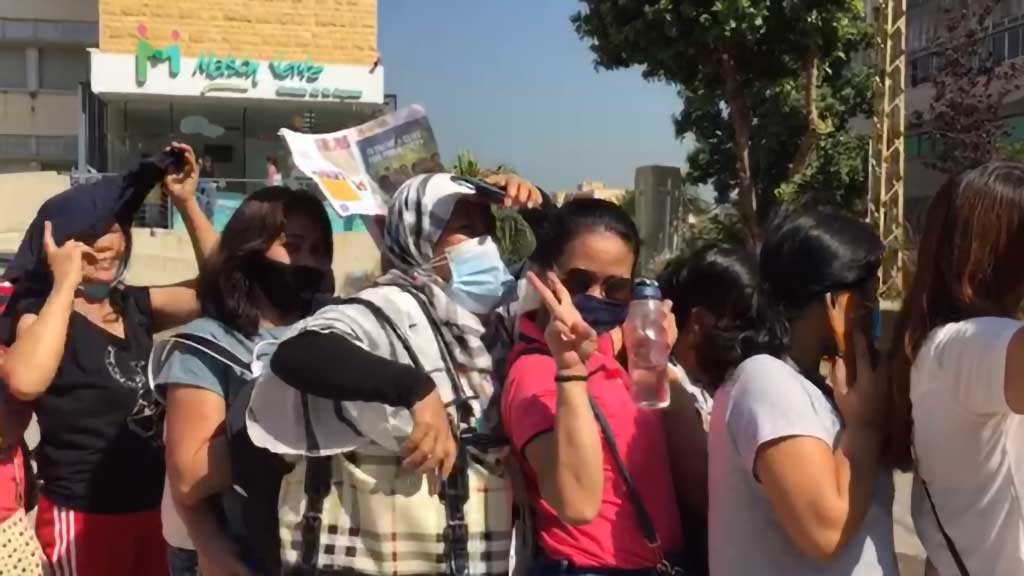Weekly News Report: August 16-22, 2021
16/08/2021
Migrant workers at the vaccination drive. Photo by Sonia Lslam
Articles and views shared in the Weekly News Report do not necessarily represent ARM’s views. Information in these articles has not been fact-checked by ARM and may contain some errors. ARM is simply compiling all news relevant to migrant communities to inform our advocacy efforts and to facilitate the work of organizations who cater to migrant communities.
Three-Day Vaccination Drive for Migrant Workers by MSF and IOM [here]
The International Organization for Migration (IOM) and Doctors Without Borders (MSF) announced a 3-day vaccination drive for migrant workers this week from August 24-26, at Sagesse high school Jdeideh.
Migrants between 30-50 years are eligible to go, following the walk-in criteria set by the Ministry of Public Health.
New Racist Decisions by Rmeich Municipality against Syrian Residents [here]
All landlords must break the contracts with Syrian residents within 15 days through the municipality;
All “foreign” tenants must relocate to the houses of their sponsors within 72 hours;
A curfew will be set in place for “Foreign” residents, especially Syrians, from 7pm to 6am.
New Baseline Assessment of Migrant Presence and Mobility Trends by IOM [here]
The International Organization for Migration (IOM) conducted a quantitative assessment of the presence and mobility trends of migrants in Lebanon, between October 2020 and June 2021. The results were as follows:
Around 207,696 migrants were identified in the 26 districts mapped;
Beirut had the largest number of migrants in Lebanon, with around 60% of the total migrant population residing there;
The majority of migrants are Ethiopians (31%), Bangladeshis (19%), and Egyptians (9%).
Report by Refugees=Partners on Media’s Role in Stereotyping Syrian Refugees [here]
Refugees=Partners posted a video addressing the role of the media in portraying Syrian refugees in Lebanon in problematic and stereotypical ways, and its contribution to racist sentiments against them. The referecned ways were as follows:
Interviewing children without consent;
Portraying early marriage as uniquely prevalent among Syrian population in Lebanon while deliberately ignoring facts and figures;
Publishing information related to ongoing criminal cases, and thus influencing the course of the cases and the public perception of Syrians;
Scapegoating Syrians to sideline the failure of public policies and the economy.
مقالات مشابهة
لديك أي أسئلة؟
للاستعلام عن هذا البيان والسياق ، راسلنا عبر البريد الإلكتروني أو املأ النموذج.
إشتركوا في النشرة الإلكترونية
نعمل في حركة مناهضة العنصرية بجهد على العديد من النشاطات والمبادرات المختلفة. معظم نشاطنا تعدّ في الإمكان بفضل فريق من المتطوعين/ات يعمل مع فريقنا الأساسي بشغف و إخلاص.
حركة مناهضة العنصرية هي حركة شعبيّة أنشأتها جهات شبابيّة ناشطة في لبنان بالتعاون مع عمّال وعاملات أجانب. نعمل معًا في الحركة على توثيق الممارسات العنصرية والتحقيق فيها وفضحها ومحاربتها من خلال مبادرات وحملات عديدة. تمّ إطلاق حركة مناهضة العنصرية عام 2010 عقب حادثة وقعت في أحد أكثر المنتجعات البحرية الخاصّة المعروفة في بيروت.
